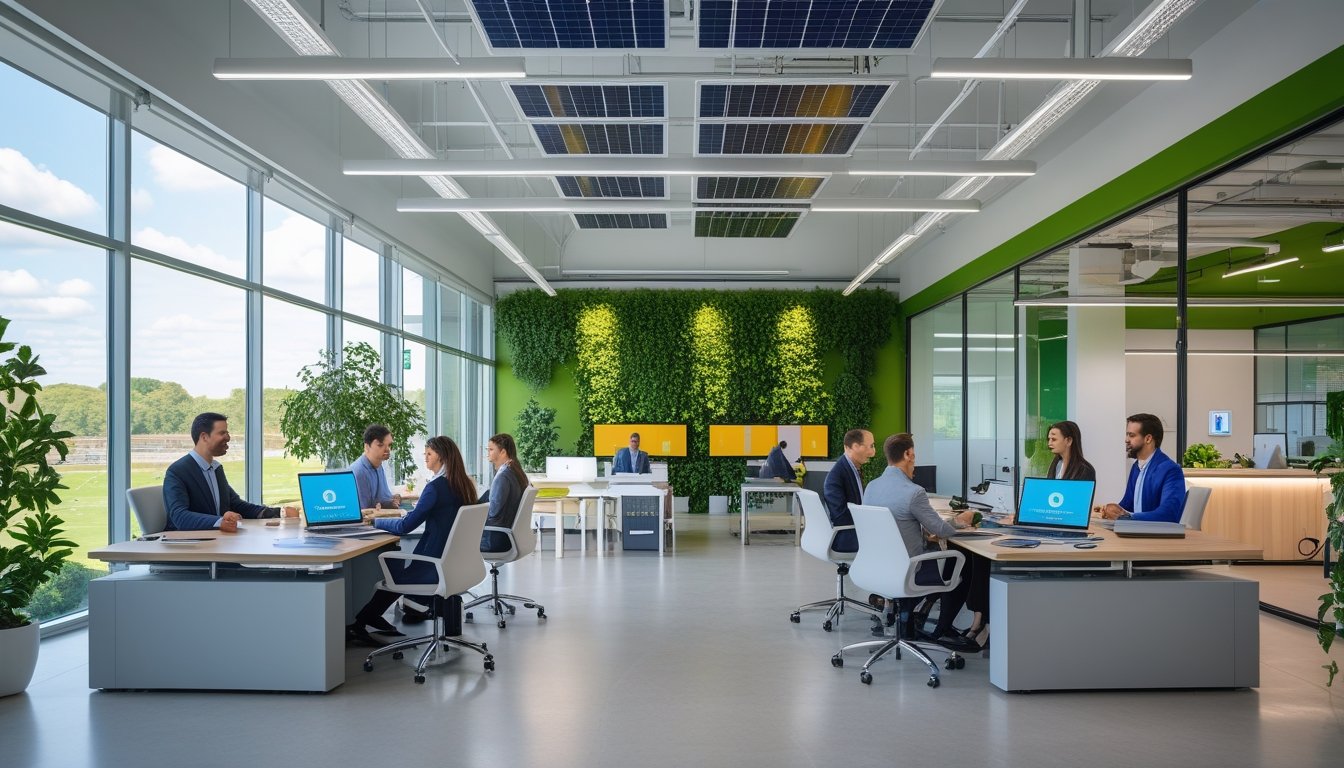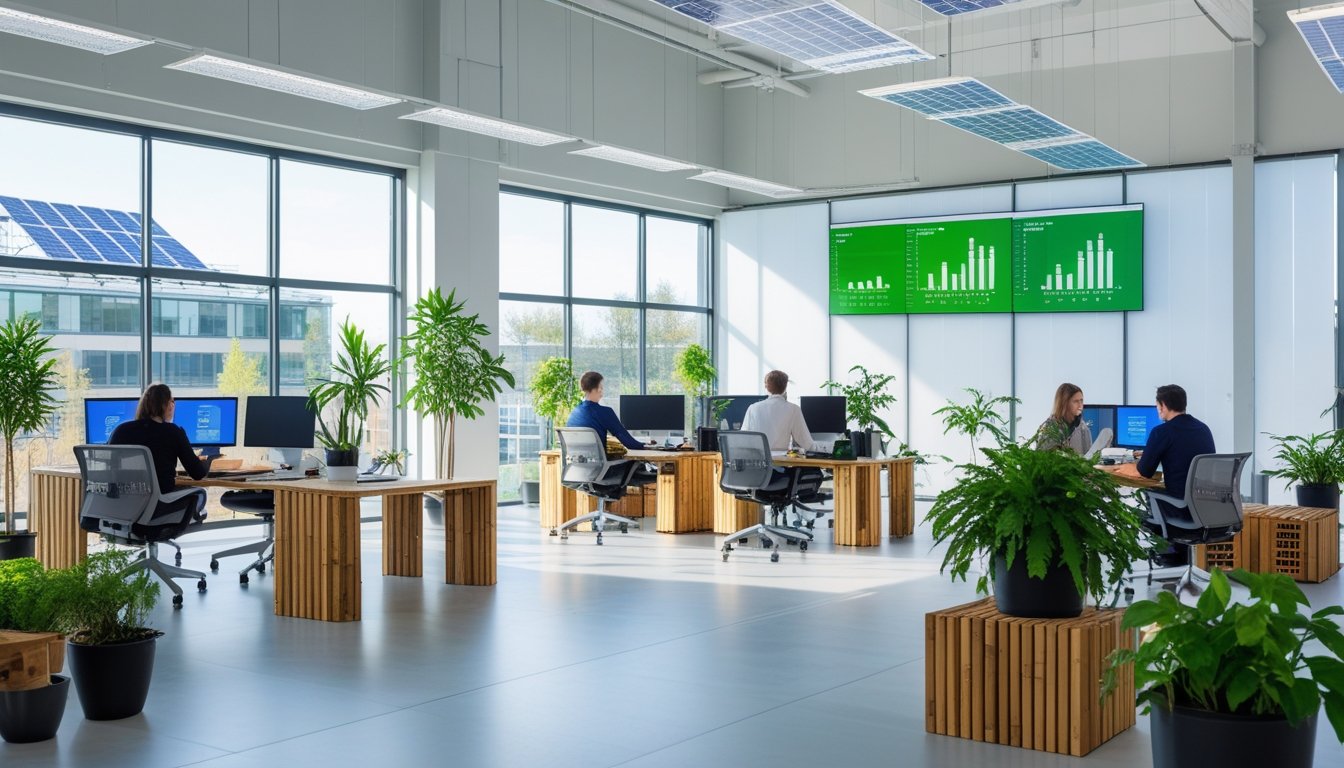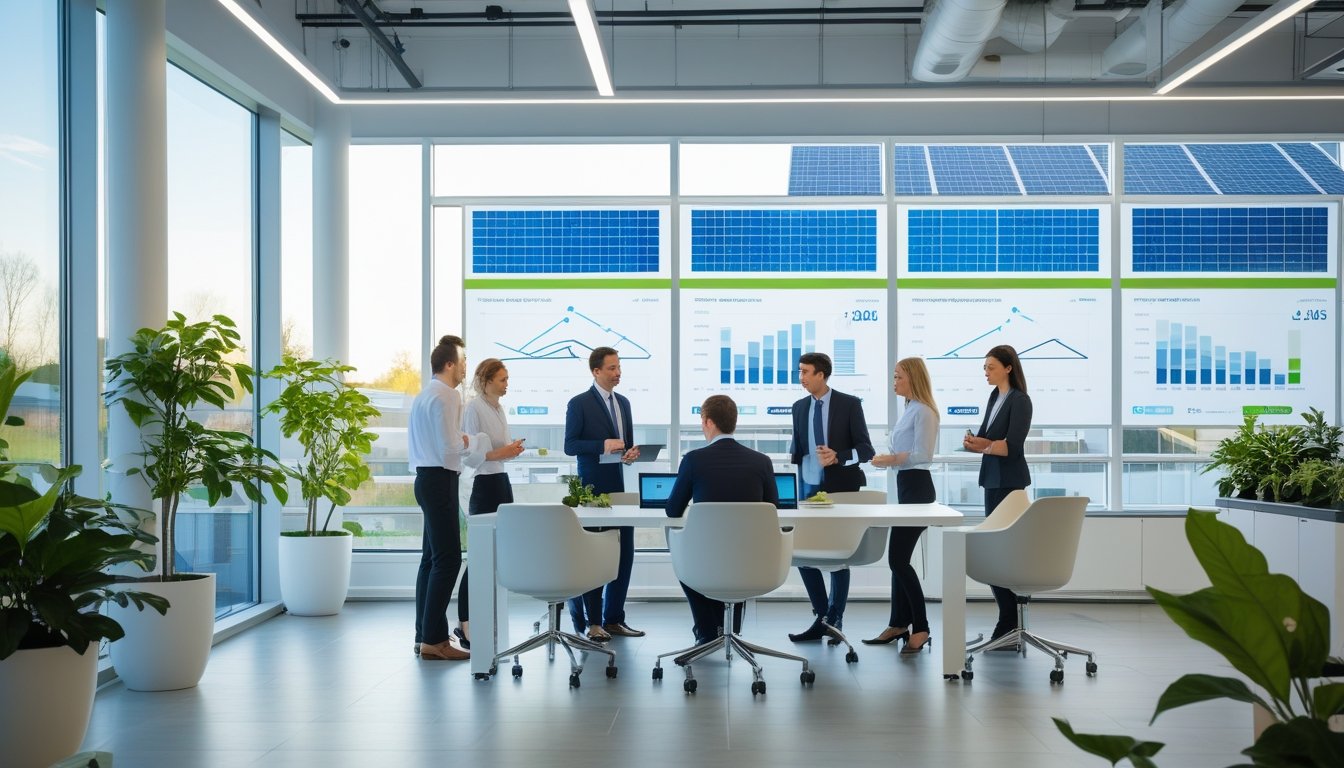Late updated: 18 Oct 2025 15:10
Written by: Amber Collins
The Future Of Green Office Technologies In The UK: Innovations and Trends
Green office technologies are set to transform the way we work in the UK. As environmental awareness grows, businesses are increasingly adopting sustainable practices. The future of green office technologies in the UK lies in their ability to enhance operational efficiency while reducing carbon footprints. Smart technologies, energy-efficient systems, and eco-friendly materials are becoming integral components of modern office spaces.

Our role as stewards of the environment pushes us to rethink the design and functionality of workplaces. The integration of AI-powered systems, automated climate control, and high-speed connectivity is redefining office environments. By harnessing these innovations, companies can create dynamic workspaces that support employee well-being and meet environmental responsibilities.
As we explore the future of green office environments, it's essential to highlight the key drivers propelling this shift. Energy efficiency, technological advancements, and employee health are not just trends but necessary components of sustainable growth. From reducing energy waste to fostering collaboration, green office technologies prove that sustainability and productivity can thrive hand in hand.
Key Takeaways
- Green technologies enhance efficiency and reduce carbon footprints.
- Smart systems are redefining UK office environments.
- Sustainable growth aligns with efficiency and environmental goals.
Key Drivers of the Future of Green Office Technologies in the UK

The landscape of office technology is rapidly evolving in the UK, driven by a combination of cutting-edge technologies, the shift in work patterns, sustainability mandates, and regulatory frameworks. These factors collectively shape the transformative journey towards greener and more efficient office environments.
Emerging Technologies Transforming Office Spaces
Emerging technologies such as Artificial Intelligence (AI) and Machine Learning (ML) are revolutionising office spaces. AI can optimise energy usage by learning usage patterns, while ML enhances predictive maintenance to reduce waste.
Augmented Reality (AR) and Extended Reality (ER) enable immersive virtual collaborations. These technologies facilitate remote demos and training sessions, reducing the need for large carbon footprints associated with travel. Integrating such innovations not only enhances operational efficiency but also aligns with sustainability goals.
The Evolution of Hybrid Work and Remote Collaboration
The rise of hybrid work, accelerated by the Covid-19 pandemic, has necessitated the rethinking of office layouts and technologies. They now need flexibility and adaptability. Many companies are investing in solutions that cater to both physical and virtual workspaces, emphasising seamless connectivity.
Remote work tools, including collaboration platforms, have become essential. They allow for efficient communication and project management across distributed teams. PwC's strategies highlight the push towards work environments that support diverse workstyles, which is now critical for business continuity.
The Role of Sustainability and Energy Efficiency
Sustainability is at the core of modern office transformations. Businesses are making significant investments in energy-efficient technologies to reduce operational costs and meet regulatory demands. Biophilic designs and eco-friendly materials contribute to this sustainable shift.
Offices are now equipped with smart lighting, heating, and cooling systems that adjust automatically based on usage and occupancy. These solutions not only decrease carbon footprints but also represent a commitment to global environmental goals by implementing green technologies.
Economic and Regulatory Influences on Office Technology Adoption
The economic benefits of adopting green office technologies are compelling. UK businesses see a return on investment through reduced energy costs and enhanced brand reputation. The Energy Savings Opportunity Scheme (ESOS) is one of several regulations encouraging such shifts.
Government policies and incentives facilitate the adoption of sustainable technologies, pushing businesses towards a greener future. As regulations tighten, companies are motivated to innovate and integrate energy-efficient solutions to remain competitive. This proactive approach ensures they meet not just current demands but are well-prepared for future regulations.
Major Innovations in Sustainable Office Design and Technology
Advancements in office design and technology are transforming workspaces to support sustainability. Our focus is on smart buildings, energy-efficient systems, nature-inspired design, and better space utilisation through digital tools. Each plays a pivotal role in creating eco-friendly offices that enhance productivity while reducing environmental impact.
Smart Buildings and Intelligent Office Systems
Smart building technologies are at the forefront of modern office design. By integrating IoT devices and intelligent systems, offices can optimise energy consumption and improve employee comfort. Sensors and analytics platforms monitor usage patterns to adjust lighting, heating, and cooling in real-time, aligning with occupancy levels. This not only reduces wastage but also supports sustainability goals.
Smart systems can seamlessly control various aspects of the workspace, such as security, access, and even collaboration tools, providing flexible and adaptable environments. The integration of voice-activated assistants further enhances convenience, allowing staff to manage systems without interrupting workflow.
Energy-Efficient Lighting and HVAC Solutions
Energy efficiency in LED lighting and HVAC systems is crucial for sustainable office environments. LED lighting offers significant savings over traditional solutions, using less electricity and having longer lifespans. Advanced systems allow for adjustment of intensity and colour temperature, mimicking natural lighting conditions that boost employee well-being.
HVAC systems, fitted with smart thermostats, are designed to maintain optimal temperatures while minimising energy use. By learning user habits and integrating with building management systems, they contribute substantially to lowering energy bills and greenhouse gas emissions.
Biophilic and Eco-Conscious Office Design
Introducing biophilic design principles into office layouts emphasises the connection between nature and interior spaces. Incorporating elements like indoor plants, natural materials, and natural lighting through large windows not only creates a more inviting atmosphere but also improves air quality and mental health.
Eco-conscious design goes beyond aesthetics to include sustainable materials such as recycled fabrics, reclaimed wood, and non-toxic finishes. These choices reduce the office's carbon footprint while supporting a healthier workplace. Emphasising durability and functionality alongside style ensures that these materials stand the test of time.
Optimising Space Utilisation Through Digital Tools
Efficient space utilisation is achievable with digital tools that help in planning and managing office layouts. By using data-driven insights, we can reconfigure workspaces to maximise productivity without expanding physical footprints. Tools like sensors and software track workspace usage, identifying under-utilised areas and facilitating hot-desking or flexible seating arrangements.
Collaboration tools integrated into this digital framework enhance communication and teamwork, whether employees are in-office or remote. Real-time data helps in adjusting layouts dynamically, promoting a balance between open and private spaces that cater to diverse working styles and preferences.
Frequently Asked Questions

Our commitment to sustainability in office spaces has sparked interest in various green technologies. These innovations not only contribute to reducing carbon emissions but also align with business sustainability targets, aided by incentives and government regulations.
What are the leading sustainable technologies being implemented in UK offices?
In the UK, businesses are adopting energy-efficient lighting, smart thermostats, and sensor-based systems to control energy consumption. The use of renewable energy sources, such as solar and wind, is also gaining momentum, supported by technologies like photovoltaic panels and small-scale wind turbines.
How are companies in the UK reducing their carbon footprint with office technology?
Companies are focusing on integrating automation and digital solutions that minimise energy waste. Smart building management systems help optimise energy use and reduce overhead costs. Additionally, cloud-based services are reducing the need for energy-intensive data centres.
What incentives are available for UK businesses to adopt green technologies within the workplace?
UK businesses can benefit from tax incentives and grants offered by government programmes. Schemes like the Enhanced Capital Allowance (ECA) and the Green Business Fund provide financial support to encourage investment in sustainable technologies.
How does energy-efficient office technology contribute to overall business sustainability goals in the UK?
Energy-efficient technologies lower operating costs, reduce environmental impact, and enhance corporate reputation. These technologies support compliance with sustainability targets by decreasing dependence on non-renewable energy sources and by reducing waste.
What role does government regulation play in the adoption of green office technologies in the UK?
The UK government plays a key role by setting regulatory standards and encouraging adoption through initiatives like the Energy Savings Opportunity Scheme (ESOS). These measures ensure businesses remain accountable and incentivise them to transition towards greener technologies.
How are advancements in technology driving the future of eco-friendly office spaces in the UK?
Technological advancements in IoT and AI are transforming office spaces into responsive environments. These technologies offer real-time data analytics, which allows for optimising energy use and enhancing the comfort and productivity of employees through smart solutions.
